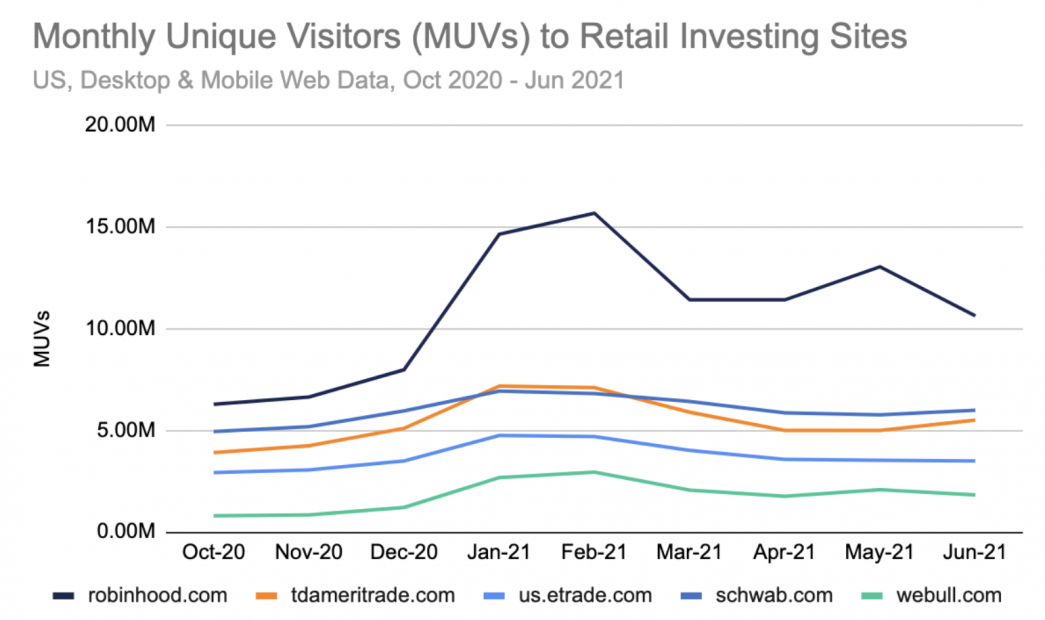The company behind investment app Robinhood is listing on NASDAQ this week, allowing its customers to subscribe to one-third of available shares directly in the app. The IPO follows strong growth over the past year, particularly in cryptocurrencies.
Robinhood, the largest mobile platform for commission-free investing, filed its IPO with the U.S. Securities and Exchange Commission on the 1st of July. The company will be listed on NASDAQ under the ticker symbol HOOD and hopes to raise $2 billion in its debut on the public markets. The company is backed by Goldman Sachs and JPMorgan at a $35 billion valuation.
The IPO is coveted by many small investors after the company caused a stir earlier this year due to trading restrictions on individual shares.
Robinhood
The Silicon Valley-based company was founded in 2013 by Vlad Tenev and Baiju Bhatt. It took the investing world by storm by allowing users to trade stocks and ETFs for free. In 2020, Robinhood's popularity reached new heights as retail investor activity surged amid the coronavirus pandemic. Given all the headlines about the company, Robinhood's IPO is highly anticipated.
In its SEC filing, Robinhood announced that as of March 31, it had 18.5 million funded accounts and $80 billion in customer assets - more than double the previous years. More than 50% of its users are first-time investors. The founders said they plan to continue to make financial investing more accessible. In line with the company's mission to "democratize finance," it will offer one-third of its shares directly to customers through the app.
Strong growth
Website visits to retailers increased sharply in the first quarter of 2021. Visits increased dramatically in January, when the GameStop saga occurred. This upward trend continued into February before slowing down slightly in March. Robinhood has successfully penetrated the retail investor market, as evidenced by the fact that its website had more visitors than those of traditional retail brokers. In both the first and second quarters, Robinhood was the only website to exceed 200 million visits.

Although visits to the site continue to show annual growth, this has declined significantly in the last 3 months. A similar trend can be observed in the usage of the website. Average dwell time, an indicator of user engagement, has also declined.
However, the company's history is not without controversy. Just recently, Robinhood was fined $70 million by the securities industry's self-regulator, FINRA. Robinhood was alleged to have misled customers. It also had system failures that harmed Robinhood's customers, according to the regulator. The start-up openly stated that it will likely face similar fines in the future.
Focus on crypto offerings
Currently, Robinhood users cannot transfer crypto assets in and out of their accounts, which may be driving some customers to platforms like Coinbase. In the company's latest financial report, it was revealed that 17% of its first quarter revenue came from cryptocurrency transactions. The company had to admit that crypto trading can also be a burden.
"We've done a lot of work behind the scenes to give our crypto customers the functionality they've been asking for. We know they want wallets, but new features should certainly be introduced. There are a lot of things we need to get right from the start." - Vlad Tenev, CEO Robinhood
As the IPO filing indicates, Dogecoin (DOGE) accounted for 34% of Robinhood's crypto trading revenue. If interest in the classic meme token wanes, this could pose a perceived risk to the business. Tenev's remarks came during Robinhood's public roadshow on Saturday, where the company's executives fielded questions from the public about its upcoming IPO.




